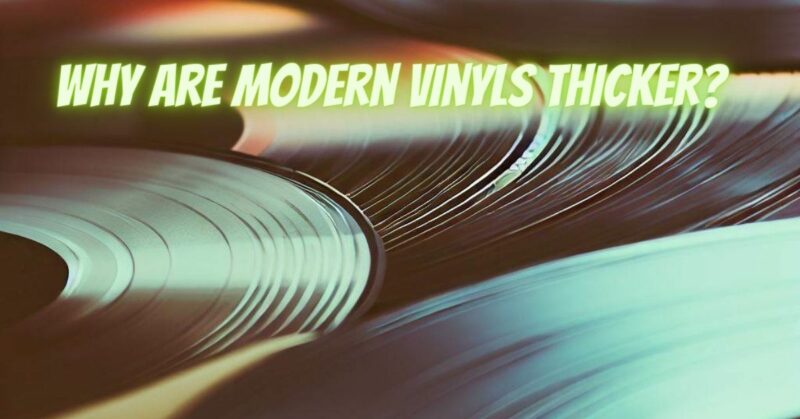If you’re a vinyl enthusiast, you might have noticed a significant change in recent years – contemporary vinyl records are notably thicker than their predecessors. This evolution in vinyl record thickness has piqued the curiosity of collectors and audiophiles alike. In this article, we will explore the reasons behind the increased thickness of modern vinyl records and how this change impacts your listening experience.
The Vinyl Resurgence
The resurgence of vinyl records in the digital age has been a remarkable trend in the music industry. Audiophiles and music lovers are drawn to vinyl for its warm, analog sound and tangible, collectible appeal. This resurgence has led to a renewed interest in the production quality of vinyl records, resulting in changes like increased thickness.
Reasons for the Increased Thickness:
- Enhanced Durability: One of the primary reasons for the increased thickness of contemporary vinyl records is improved durability. Thicker vinyl is less prone to warping and damage during handling, shipping, and playback. This durability ensures that your vinyl records remain in excellent condition for years to come.
- Better Sound Quality: Thicker vinyl can provide better sound quality due to increased stability. It reduces the risk of playback issues such as tracking errors and excessive surface noise. The increased mass of thicker vinyl can also contribute to improved bass response and overall audio fidelity.
- Reduced Surface Noise: Thicker vinyl records often have quieter surfaces, resulting in reduced surface noise during playback. This reduction in noise enhances the listening experience and allows the music to shine more brightly.
- Resistance to Groove Wear: Thicker vinyl records are less susceptible to groove wear caused by the stylus tracking through the vinyl’s grooves. This prolongs the lifespan of the record and maintains its sonic integrity over time.
- Artistic and Aesthetic Choices: Some artists and record labels have opted for thicker vinyl records as a deliberate artistic choice. Thicker records can have a more substantial, premium feel, enhancing the overall packaging and presentation of the album.
- Collector’s Appeal: For collectors, thicker vinyl records are often associated with higher-quality pressings and limited editions. This adds to the collectible value of the vinyl and can make it a sought-after item.
Challenges and Considerations:
While thicker vinyl records offer several advantages, there are also considerations to keep in mind:
- Compatibility: Thicker records may require adjustments to tonearm settings and tracking force on some turntables. It’s essential to ensure that your turntable can accommodate thicker vinyl.
- Storage Space: Thicker records can consume more shelf space in your collection due to their increased dimensions. Make sure you have adequate storage for these records.
- Playback Equipment: Verify that your turntable and stylus are compatible with thicker records to prevent excessive wear or damage to your equipment.
The increased thickness of contemporary vinyl records is a testament to the enduring appeal and adaptability of this analog format. Thicker vinyl offers enhanced durability, improved sound quality, reduced surface noise, and a premium feel. As vinyl continues to evolve and thrive in the digital age, collectors and audiophiles can appreciate these advancements that contribute to a more enjoyable and enduring listening experience. Whether you’re a seasoned vinyl enthusiast or new to the world of records, the thicker vinyl trend is a positive development that benefits all who cherish the vinyl format.


